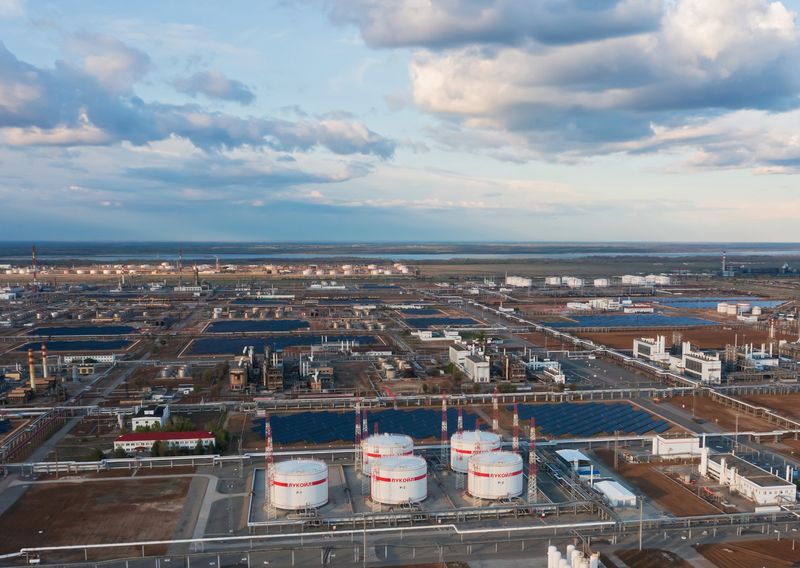By Scott DiSavino
NEW YORK (Reuters) -Oil prices plunged about 5% to an eight-month low on Friday as the U.S. dollar hit its strongest level in more than two decades and on fears rising interest rates will tip major economies into recession, cutting demand for oil.
Brent futures fell $4.31, or 4.8%, to settle at $86.15 a barrel, down about 6% for the week. U.S. West Texas Intermediate (WTI) crude fell $4.75, or 5.7%, to settle at $78.74, down about 7% for the week.
It was the fourth straight week of declines for both benchmarks, the first time this has happened since December. Both were in technically oversold territory, with WTI on track for its lowest settlement since Jan. 10 and Brent for its lowest since Jan. 14.
U.S. gasoline and diesel futures were also down more than 5%.
The U.S. Federal Reserve raised interest rates by a hefty 75 basis points on Wednesday. Central banks around the world followed suit with their own hikes, raising the risk of economic slowdowns.
"Oil tanks as global growth concerns hit panic mode given a chorus of central bank commitments to fight inflation. It seems central banks are poised to remain aggressive with rate hikes and that will weaken both economic activity and the short-term crude demand outlook," aid Edward Moya, senior market analyst at data and analytics firm OANDA.
The U.S. dollar was on track for its highest close against a basket of other currencies since May 2002. A strong dollar reduces demand for oil by making the fuel more expensive for buyers using other currencies.
"We had the dollar exploding higher and pushing down dollar-denominated commodities like oil and growing fears over the looming global recession that is coming as the central banks raise interest rates," said John Kilduff, partner at Again Capital LLC in New York.
The euro zone's downturn in business activity deepened in September, a survey showed, suggesting a recession looms as consumers rein in spending and as governments urge energy conservation following Russia's moves to cut off European supply.
Wall Street's main indexes slid more than 2% on Friday as investors feared the U.S. Federal Reserve's hawkish policy actions to quell inflation could trigger a recession and dent corporate earnings. The dollar (DXY) index reached its highest in over two decades, pressuring oil prices.

Russia launched referendums aimed at annexing four occupied regions of Ukraine, raising stakes of the war in what Kyiv called a sham.
On the supply side, efforts to revive the 2015 Iran nuclear deal have stalled as Tehran insists on closure of the U.N. nuclear watchdog's investigations, a senior U.S. State Department official said, easing expectations of a resurgence of Iranian crude oil exports.